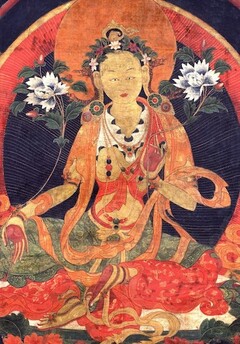Light of Compassion
༄༅། །ཡེ་ཤེས་མཁའ་འགྲོའི་ཚོགས་ལ་གསོལ་འདེབས་ཐུགས་རྗེའི་འོད་སྣང་ཞེས་བྱ་བཞུགས།
Light of Compassion
A Prayer to the Wisdom Ḍākinīs
by Dilgo Khyentse Rinpoche
ཆོས་དབྱིངས་རྡོ་རྗེ་བཙུན་མོའི་ཡེ་ཤེས་དབྱིངས། །
chöying dorjé tsünmö yeshe ying
Within the wisdom-space of the Vajra Queen, the dharmadhātu,
བདེ་སྟོང་སྒྱུ་འཕྲུལ་དྲྭ་བའི་སྤྲིན་ཕྲེང་ལས། །
detong gyutrul drawé trin treng lé
From garlands of clouds of the bliss-empty magical net,
བྱིན་རླབས་དངོས་གྲུབ་ཕྲིན་ལས་གློག་གར་གྱིས། །
jinlab ngödrub trinlé lok gar gyi
Your lightning dance of blessings, siddhis, and activities
ཕན་བདེའི་ཆར་འབེབས་མཁའ་འགྲོར་གསོལ་བ་འདེབས། །
pendé charbeb khandror solwa deb
Showers us with goodness and happiness—to you ḍākinīs I pray!
ཐུབ་པའི་སྤྱན་སྔར་གངྒའི་ལྷ་མོའི་ཚུལ། །
tubpé chen ngar gang gé lhamö tsul
As Gaṅgādevī in the presence of the Sage,1
རྒྱལ་ཀུན་གསུང་གི་རྡོ་རྗེ་དབྱངས་ཅན་མ། །
gyal kün sung gi dorjé yangchenma
And Sarasvatī, vajra speech of all buddhas,
གུ་རུའི་དགྱེས་སྡེ་གསང་སྔགས་བཀའ་སྡུད་མོ། །
gurü gyé dé sang ngak ka dümo
Delighting your Guru, you compiled the Secret Mantra’s teachings.
ཡེ་ཤེས་མཚོ་རྒྱལ་ཞབས་ལ་གསོལ་བ་འདེབས། །
yeshe tsogyal zhab la solwa deb
Lady Yeshé Tsogyal, to you I pray!
སངས་རྒྱས་ཀུན་གྱི་ཕྲིན་ལས་མྱུར༵་མ༵འི་ཚུལ། །
sangye kün gyi trinlé nyurmé tsul
Swift One—activity of all the buddhas—
གདུལ་དཀའི་འགྲོ་ཀུན་སྒྲོལ་བ་དཔ༵འ་མོ༵འི་མཚན། །
dul ké dro kün drolwa pamö tsen
Renowned heroine—liberator of the hard-to-tame—2
སྲིད་ཞིའི་གདུང༵་སྐྱོབ༵་རྒྱལ་བ་ཀུན་ཡུམ་མ། །
sizhi dung kyob gyalwa kün yum ma
Mother of all Victors, Umbrella3 over existence and peace,
རྗེ་བཙུན་འཕགས་མ་སྒྲོལ༵་མ༵ར་གསོལ་བ་འདེབས། །
jetsün pakma drolmar solwa deb
Noble Lady Tārā, to you I pray!
རྣམ་ཐར་གསུམ་རྫོགས་དབྱིངས་ཡུམ་ཀུན་བཟང་མོ། །
namtar sum dzok ying yum kunzang mo
You are Samantabhadrī, mother of space, perfection of the three doors of liberation,
ཡེ་ཤེས་ཀློང་ལྔ་རིགས་ཀྱི་ཡུམ་ཆེན་ལྔ། །
yeshe long nga rik kyi yumchen nga
The five great mothers of the five wisdom expanses and five families,
གནས་གསུམ་མཁའ་འགྲོའི་རྗེ་མོ་ཁྲོས་མ་ནག །
né sum khandrö jemo tröma nak
And Krodhikālī, empress of the ḍākinīs of the three abodes,
དབྱིངས་ཕྱུག་རྡོ་རྗེ་ཕག་མོར་གསོལ་བ་འདེབས། །
yingchuk dorjé pakmor solwa deb
Dhātviśvarī Vajravārāhī, to you I pray!
མཆོག་ཏུ་མི་འགྱུར་བདེ་ཆེན་རྡོ་རྗེའི་གཟུགས། །
chok tu mingyur dechen dorjé zuk
Your vajra-form of great bliss, utterly unchanging,
གར་གྱི་དབང་ཕྱུག་དགྱེས་མའི་ཡུམ་གྱི་ཚུལ། །
gar gyi wangchuk gyé mé yum gyi tsul
Takes the guise of Nateśvara’s consort, lady of pleasure,
ཨོ་རྒྱན་ཌཱ་ཀིའི་གཙོ་མོར་དངོས་གྲུབ་བདག །
orgyen daki tsomor ngödrub dak
Queen of Siddhis, chief amongst Uḍḍiyāna’s ḍākinīs,
གསང་བ་ཡེ་ཤེས་ཞབས་ལ་གསོལ་བ་འདེབས། །
sangwa yeshe zhab la solwa deb
Lady Guhyajñānā, to you I pray!
དངོས་གཅིག་དུ་མའི་རོལ་པའི་དྷ་ཀི་མ། །
ngö chikdumé rolpé dhakima
Ḍākinī—single essence with myriad displays,
དོན་དམ་ལྷན་ཅིག་སྐྱེས་མའི་ཡེ་ཤེས་དབྱིངས། །
döndam lhenchik kyé mé yeshe ying
Ultimate, co-emergent wisdom-space,
འཁོར་འདས་ཀུན་ཁྱབ་མཉམ་ཡངས་བརྡལ་བ་ཆེའི། །
khordé künkhyab nyam yang dalwa ché
Vast, pervasive equality permeating all of saṃsāra and nirvāṇa—
ངོ་བོར་འདུ་འབྲལ་མེད་པས་གསོལ་བ་འདེབས། །
ngowor dudral mepé solwa deb
Never parting from this essence, to you I pray!
ངེས་འབྱུང་སྐྱོ་ཤས་ལམ་གྱིས་རྒྱུད་སྦྱངས་ནས། །
ngejung kyoshé lam gyi gyü jang né
By purifying our minds through the path of renunciation and weariness,
དད་མོས་བཙོན་པས་བྱང་ཆུབ་སྤྱོད་པ་རྫོགས། །
dé mö tsönpé changchub chöpa dzok
Through faith, devotion and diligence, may we perfect the awakened conduct.
ཁྱད་པར་སྨིན་གྲོལ་ཟབ་མོའི་གསེང་ལམ་གྱིས། །
khyepar mindrol zabmö seng lam gyi
Especially, through the profound, direct path of ripening and liberation,
ཟུང་འཇུག་བདེ་ཆེན་རྡོ་རྗེའི་གྲོང་རྩེན་ཤོག །
zungjuk dechen dorjé drong tsen shok
May we enjoy the vajra citadel of unified great bliss!
སྤྱོད་པ་གསུམ་གྱི་ཉེ་རྒྱུ་མཐར་སོན་པས། །
chöpa sum gyi nyé gyu tarsönpé
Perfecting the three conducts, the immediate cause,4
འབར་བ་གསུམ་གྱི་རླུང་སེམས་དབུ་མར་བཅིང་། །
barwa sum gyi lungsem umar ching
May I bind the three blazes of the prāṇa-mind in the central channel,5
འདུ་བ་གསུམ་གྱིས་དོན་གཉིས་ལྷུན་གྲུབ་ནས། །
duwa sum gyi dön nyi lhündrub né
And through three gatherings may the two benefits be spontaneously accomplished.6
གནས་གསུམ་མཁའ་འགྲོའི་ཚོགས་དང་སྐལ་མཉམ་ཤོག །
né sum khandrö tsok dang kal nyam shok
Thus may I gain the same fortune as the ḍākinīs of the three places.
ཚེ་བས་ཀུན་ཏུ་ཡེ་ཤེས་མཁའ་འགྲོ་མས། །
tsewé küntu yeshe khandromé
In all my future lives, O wisdom ḍākinīs,
རྗེས་སུ་བཟུང་སྟེ་རྡོ་རྗེ་ཐེག་མཆོག་གྱིས། །
jesu zung té dorjé tek chok gyi
Take me under your care! Through the supreme Vajrayāna,
གསང་མཛོད་འདོད་རྒུར་སྤྱོད་པ་ལྷན་སྐྱེས་ཀྱིས། །
sangdzö dögur chöpa lhenkyé kyi
The innate, secret treasury that yields all to be desired,
ཡེ་ཤེས་ཐིག་ལེར་གཉིས་མེད་བྱང་ཆུབ་ཤོག །
yeshe tikler nyimé changchub shok
May I awaken, merging indivisibly with the wisdom bindu!
ཅེས་པའང་མཁྱེན་རྟོགས་བདུད་རྩིའི་སྣང་བས་མཛེས་པའི་མཆོག་སྤྲུལ་རིན་པོ་ཆེ་ཨོཌི་ཡ་ནའི་གསང་ཡུམ་བདེ་ཆེན་ནས་གསུང་བསྐུལ་བཞིན་སྙོམས་ལས་པ་མཁྱེན་བརྩེའི་འོད་ཟེར་པདྨ་དབང་ཆེན་དགྱེས་པ་རྩལ་གྱིས་རི་ཁྲོད་ཐེག་མཆོག་ཆོས་འཕེལ་གླིང་དུ་སྙིང་ཐིག་གོང་འོག་གི་སྨིན་གྲོལ་བཏོན་པའི་སྐང་ས་བྲིས་པ་གསང་ཆེན་རྡོ་རྗེའི་མྱུར་ལམ་མཐར་སོན་པས་དངོས་གྲུབ་འདོད་རྒུའི་གསང་མཛོད་ལ་དབང་ཐོབ་པའི་རྒྱུར་གྱུར་ཅིག
Dechen,7 the secret consort of Uḍḍiyāna Choktrül Rinpoche, who is splendorous with the ambrosial light of wisdom and realization, made the request, and therefore, I, the lazy Khyentsé Özer Pema Wangchen Gyepa Tsal, wrote this in the mountain hermitage of Tekchok Chöphel Ling on the occasion of the chanting of the ripening empowerments and liberating instructions of the earlier and later Nyingtik (Heart Essence) teachings. May it be a cause for the completion of the swift vajra path, the great secret, leading to the attainment of mastery over the secret treasury of siddhis and all that is desirable.
| Samye Translations, 2019. (Translated by Peter Woods, Stefan Mang and Oriane Lavolé.)
- ↑ During the time of Buddha Śākyamuni, Yeshé Tsogyal took birth as Gaṅgādevī, who made a compilation of the Buddha’s teachings.
- ↑ The Tibetan text explicitly shows that “Swift One” (Turā, myur ma) and “Heroine” (Vīrā, dpa’ mo) are epithets of Tārā.
- ↑ A references to Sitātapatrā (gdugs dkar mo).
- ↑ This is a reference to the path of Anuyoga. The three conducts (spyod pa gsum) are blessing (bying gyis rlob), overpowering (dbang bsgyur) and skillful means (thabs).
- ↑ The three blazes (’bar ba gsum) are blissful warmth in the body (lus la bde drod), potency in speech (ngag la nus pa) and the realization in the mind (sems la rtogs pa).
- ↑ The three gatherings (‘du ba gsum) are people during the day (nyin mor mi), ḍākinīs at night (mtshan mor mka’ ‘gro) and material resources at all times (rtag tu zas nor).
- ↑ i.e., Sangyum Kunzang Dechen, the consort of Tulku Urgyen Rinpoche.
